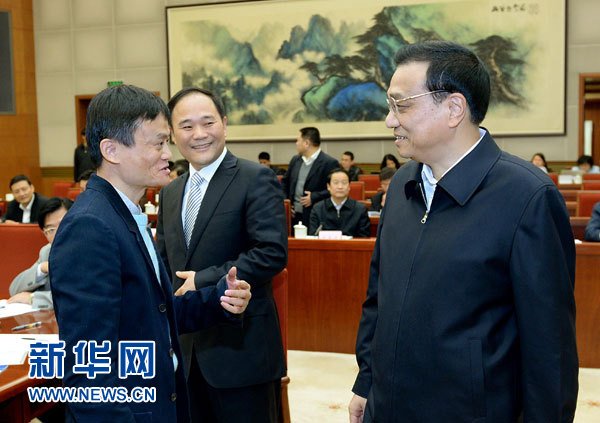
Since April 2013, Premier Li Keqiang has held meetings with entrepreneurs in Zhongnanhai on five occasions, and he listened to their opinions and suggestions concerning downward pressure on the Chinese economy, Xinhua reported.
In a meeting early in November, Alibaba Chairman Jack Ma Yun said he expected the company’s Single’s Day sales volume to exceed 30 billion yuan (about $4.8 billion).
“It is something traditional business models can’t imagine,” said Ma.
As the country’s labor force has become more educated and professional — the Internet and other emerging industries have demonstrated great vitality and are changing the country’s economy.
But traditional industries — including home appliances, construction and real estate — are facing severe challenges following the rapid development over the last three decades, as enterprises in these industries face financing issues.
But these industries will find opportunities in innovation, which will be vital for an enterprise’s competitiveness.
Li also met with heads of domestic and foreign companies in China (Shanghai) Pilot Free Trade Zone, on Sept 18.
Zhao Linghuan, chairman of Hony Capital, a private equity firm, said in the meeting that the requirement for administrative approval to invest abroad is not in line with how the market works — and it is not in line with international conventions.
Shortly after the meeting, the government decided in an executive meeting on Oct 8 to abolish the requirement for administrative approval concerning most overseas investment projects.
The move means that 99 percent of the overseas investment projects the State Council listed in its 2013 catalog as requiring administrative approval will in fact not require this approval.
The companies making such investments will only be required to register with the authorities, thus facilitating overseas investment.
Private enterprises are estimated to contribute more than 60 percent of China’s GDP, hiring more than 80 percent of the workforce in urban areas, and creating 90 percent of all new jobs every year.
A communiqué issued after the Central Economic Work Conference 2014 said that China should make better use of the country’s entrepreneurial talent.
“The accuracy of macroeconomic statistics needs to be verified by the experience of entrepreneurs, and the government needs to listen to the opinions and suggestions of heads of enterprises — about how the economy will turn out in the next phase of growth and about what kind of government measures should be implemented,” said the Premier.
